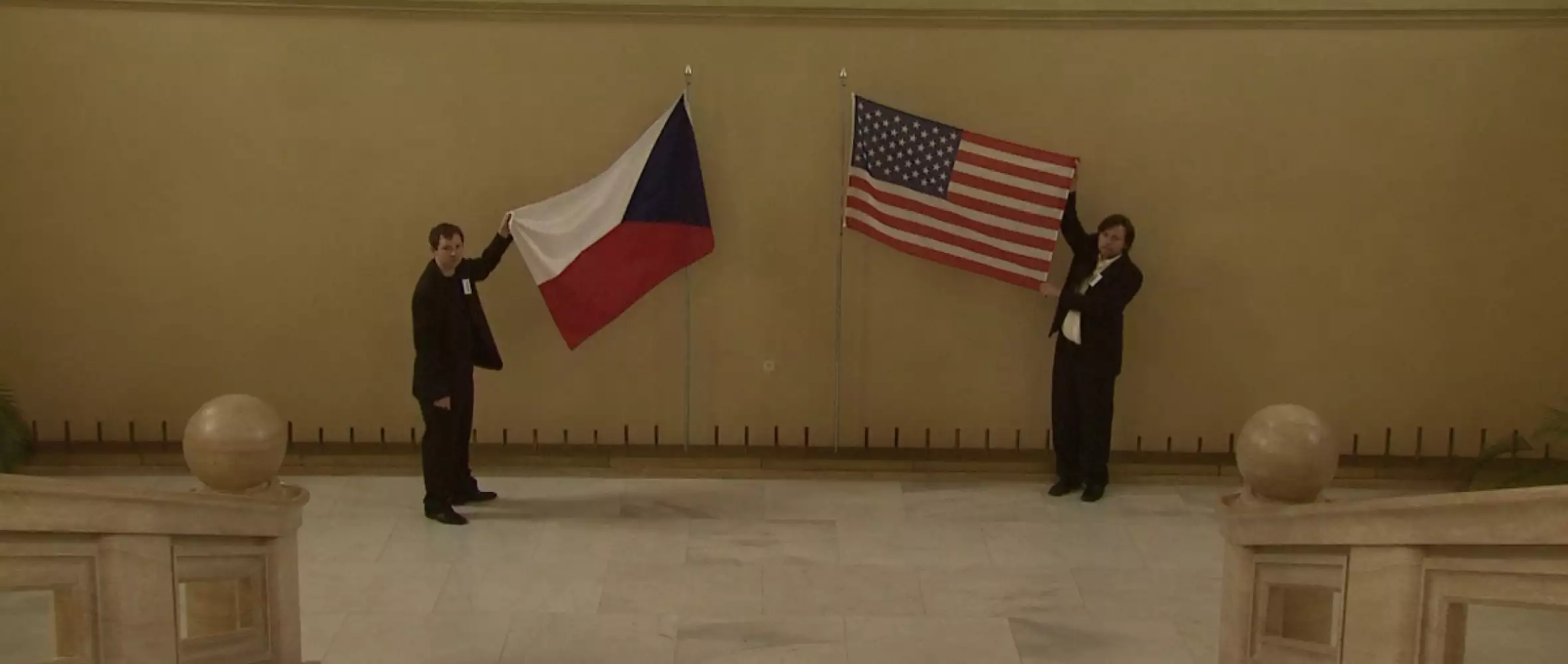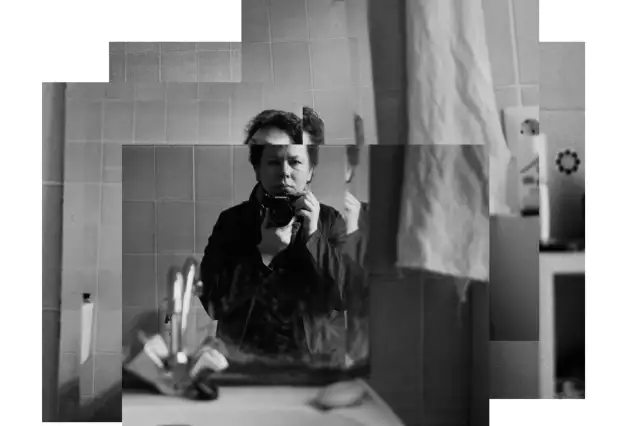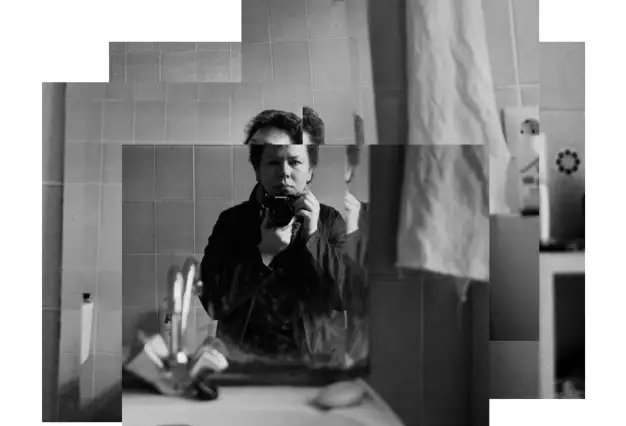
27 August 2020
Ingenious pranksters from the Hypermarket Film
Ingenious pranksters from the Hypermarket Film

Czech production outfit Hypermarket Film built its brand of authored documentaries with international outreach by contriving the biggest consumerist hoax in the history of the Czech Republic, capturing online predators, and unmasking a neo-Nazi.
Article by Martin Kudláč for CZECH FILM magazine / Summer 2020
Shortly before the COVID-19 pandemic disrupted cinema operations as social distancing measures were put in place, Czech box-office history was in the making. Caught in the Net took just seven days to become the most-watched homegrown documentary in national cinema history.
So strong was its opening-week release that the film even rivalled mainstream Czech commercial fare. By every indication, Caught in the Net was poised to maintain its momentum, had cinemas not been forced to shutter their doors. With its box-office numbers, national buzz, and artful production values, it offers a prime example of what a blockbuster documentary can look like.
Caught in the Net is a codirecting effort by emerging filmmaker Barbora Chalupová and seasoned documentarist Vít Klusák. Produced by Hypermarket Film, it gives a firsthand look at the behavior of online sexual predators. To make this possible, the directors cast three women who posed as minors on the internet and captured the escalating interactions between them and the men who attempted to prey on them.
Caught in the Net exposes the process of cyberbullying and online abuse, starting with “innocent” flattery that quickly graduates into blackmail, threats, and depraved propositions to the supposed 12-year-olds. This method of “pranking” is not a new approach for Vít Klusák and Hypermarket Film, the company he co-founded with Filip Remunda, both of whom are household names to Czech moviegoers.
It all began with a hoax
The independent production outfit Hypermarket Film was established in 2003. The following year, the feature debut of the then-students Remunda and Klusák made a huge splash, propelling them into the domestic and international spotlight. The pair’s graduation film, Czech Dream (2004), “a making of” marketing a fictional superstore, turned out to be the biggest anti-consumerist hoax in the country’s history and laid the foundations for their signature style and authorial approach, which have defined their careers as both filmmakers and producers.
Czech Dream unmasks the workings of marketing and the influence of the media in a post-socialist society. While fabricating the hoax and recording behind the scenes of its preparation, the filmmakers touch on several issues. Apart from being a professionally executed con job, the project acted as a sociological experiment, giving rise to its own genre: “provocumentary” or “documockmentary.”
Designed as “a psychosocial experiment,” Caught in the Net falls into the same category. Over the course of their thought-provoking careers, Remunda and Klusák have mastered the art of tackling serious subjects in entertaining form. This has enabled them to bring hot-button social and political issues to a broad audience both at home and abroad, while garnering critical and audience acclaim.
Atheists of objective documentary
Remunda and Klusák cultivated their original style of documentary filmmaking without regard for conventions, making them no strangers to controversy. They both graduated from Prague’s FAMU, attending classes taught by Karel Vachek, one of the most important Czech documentarists of the post-Velvet Revolution era.
As students of Vachek, Remunda and Klusák were especially influenced by his use of performance, verging on theatricality. They rarely observe from a distance, instead actively involving themselves in situations. This shifts their works away from the passive examination expected of documentaries to stir civic engagement. Klusák and Remunda’s films serve as a vehicle for activism in the same vein as agit-doc directors Michael Moore and Morgan Spurlock. However, even their most serious works, such as Caught in the Net, feature both humor and irony with a strong sense of the absurd — these are the signature traits of their poetics.
“There’s no such thing as an objective documentary” has come to serve as the rallying cry for this dynamic duo of docu-provocateurs.
Authorship is what makes it tick
Klusák and Remunda followed their smash hit Czech Dream with Czech Peace in 2010, earning them an endorsement from Michael Moore himself, who called it “one of the best documentaries that I’ve seen in the last year.” Czech Peace captures the clashes over plans to build a U.S. military base in the Czech Republic, unmasking the interaction between geopolitics and domestic civil society.
Although Remunda and Klusák are the owners and poster boys of Hypermarket Film, they don’t just produce and direct projects for themselves. In addition to Klusák’s All for the Good of the World and Nošovice (2010) and The White World According to Daliborek (2018) — an attempt to understand the worldview of a neo-Nazi, which results in its deconstruction — Hypermarket has also produced and coproduced films by both budding and established documentarists, from at home and abroad alike.
The company’s core team comprises executive producer Tereza Horská (who previously worked at the Institute of Documentary Film, founded by Remunda) and production manager Anna Poláčková, with international coproductions currently handled by Galina Stepanova, who is based in London.
“Filip is in charge of international coproductions, and loves to shoot in foreign countries, whereas Vít prefers to work on domestic topics,” says Horská. This diversity of preferences is another core part of what makes Hypermarket tick, she says. The company’s sole taboo is commercials, which both owners have vowed never to do.
Besides Caught in the Net, other recent Hypermarket films include the international co-productions Town of Glory (2019), by Dmitry Bogolyubov, and FREM (2019), an experimental sci-fi documentary (international premiere at the Berlinale's Forum, 2020) by up-and-coming Slovak director Viera Čákanyová. Subtitled “a requiem for the vanishing species of Homo sapiens,” FREM reflects on the limits of anthropocentric thinking from the perspective of artificial intelligence.
While the projects on Hypermarket’s roster differ in terms of subject matter, directors, and styles, one constant prevails: they are all author-driven. One of their most significant cultural contributions is the documentary cycle Czech Journal (2013–2020), created by Remunda and Klusák for Czech Television. Each episode of the series probes a social issue that polarizes Czech society, unveiling the complexities that lie beneath. Topics range from xenophobia toward Roma and immigrants to low-wage working conditions and their social impact to critical moments in national politics, be it a presidential election or the so-called methanol affair.
At root, Czech Journal is an anthology of authored documentaries with a rotating roster of directors, both emerging and experienced, responsible for each episode, while Remunda and Klusák play the role of showrunners throughout the six seasons.
Provocumentaries par excellence
Even as Hypermarket has expanded beyond the borders of Czech turf, the company has developed a close circle of collaborators. Producer Natalia Manskaya, of the Latvian outfit Studio Vertov, has been a recurring partner on projects by her husband, the prominent Russian documentarist Vitaly Mansky. Hypermarket has coproduced three of his projects so far: Pipeline (2013), an observational docu-road-movie about a Russian gas pipeline from western Siberia to western Europe; Under the Sun (2015), a behind-the-scenes look at the making of propaganda in North Korea; and Putin’s Witnesses (2018), where Mansky put together from footage he shot following Vladimir Putin around at the time of his ascent to power.
Currently, Hypermarket is involved in two Mansky-helmed projects: Family and Gorbachev: The Last Word. For the latter, coproduced with ARTE and Czech Television, Mansky gained exclusive access to conduct interviews with the Soviet Union’s historic last leader. The footage is now in the editing room, and the final cut is expected by the end of this year. The Creative Europe MEDIA program provided support for Family, presently in development, a time-lapse documentary about conservative parents in Moscow and their daughter’s dilemma about whether to adhere to their cloistered lifestyle or explore the outside world.
Klusák and Remunda’s firm also maintains coproduction partnerships in Germany with Gebrueder Beetz Filmproduktion Berlin and Saxonia Entertainment. At the moment, Remunda is working with Christian Beetz from Gebrueder Beetz on the latest project from the infamous gonzo activists Andy Bichlbaum and Mike Bonanno, aka the Yes Men. The “prankumentary” The Yes Men Build a Wall, a German-Czech-Canadian coproduction directed by Jared Raab, is a performative film about the walls separating nations, races, and classes.
Hypermarket is also co-producing Conspiracy of Silence, the latest project by Slovak documentarist and producer Robert Kirchhoff. A historical essay shot in the style of film noir, Kirchhoff’s film revisits the legacy of Alfred Wetzler and Rudolf Vrba, whose 1944 report was one of the first to document the operation of the Nazi German gas chambers killing Jews in Auschwitz-Birkenau. This collaboration with Kirchhoff and his company, atelier.doc, follows the award-winning project Steam on the River (2015), a labor of 10 years, in which Remunda and Kirchhoff created a portrait of three jazz musicians from the former Czechoslovakia — a documentary jam session subverting the conventions of biography.
Remarkably, the Hypermarket founders continue to be busy on their own projects as well. Their next film, a provocumentary team effort by Klusák and Remunda titled Once Upon a Time in Poland, is billed as “an existential comic road-movie.” The duo again deploy their trademark methods of performative documentary “Borat-style” as they follow a Czech film crew’s quest to understand Polish Catholicism. The inherent comicality of the project stems from the fact that the Czech Republic is the most atheist country in Europe while Poland sits at the opposite end of the spectrum. But beyond the laughs to be had in pranking so many people at once, Once Upon a Time in Poland lays bare the disturbing grip of religion on government in Poland and the impact of the Catholic Church’s institutional power over society. The film is coproduced by award-winning documentary director and producer Peter Kerekes, one of Hypermarket’s partners in Slovakia. Previously they teamed up on Caught in the Net and the multinational feature-length anthology documentary Occupation 1968 (2018).
Upending the game cinematically
You would think that was enough, but Klusák and Remunda are both also pursuing solo projects under the Hypermarket Film banner. For his part, Remunda has been working the past four years on The Divine Voice, interviewing people from Havana to Tokyo whose lives were touched by the legendary Czech crooner Karel Gott. Currently in development, the movie is billed as a musical essay and as “a road movie through the country of the absurdity of life and its deep meaning in moments of harmony with the universe.”
Remunda is also starting work on yet another unorthodox portrait, titled It’s Not Moscow Here!, about Russia as seen through the eyes of a man who loves Putin and his country. The director describes the man as uber-candid “in the Švejkian sense,” providing an uncanny take on life in present-day Russia. Tantalizingly, Remunda adds that he gained access to materials that no other European filmmaker has managed to get their hands on before.
Last in Remunda’s forthcoming series of portraits is Love Exposed, slated for completion in 2022. This nonfiction film presents an unorthodox portrait of Vlastimil Kula, a Czech photographer who explored the subjects of sexual freedom and desire. The movie is framed as a confrontation with his daughter Blanka Kulová, a film editor and Hypermarket Film collaborator.
As for the other half of Hypermarket’s founding pair, Klusák, the insatiable chronicler of momentous domestic events, is in the field gathering material on the impact of COVID-19 on everyday life. The resulting project, Big Nothing, co-directed by Klusák’s wife, Marika Pecháčková, will be a poetic-essayistic portrait of society during the biggest public health crisis in the country’s history.
“We strive to observe reality as if we were reading a 100-year-old newspaper article,” says Remunda, explaining the practice and philosophy behind Hypermarket’s work. The goal, he says, is to perceive the world “as a theater of the absurd.” After nearly two decades in the film industry, the co-owner of Hypermarket Film describes the changes as a product of evolution, whether in the company’s own projects, TV work, or international coproductions.
In the short term, Remunda says his ambition is a more prominent use of cinematic language in upcoming projects, including It’s Not Moscow Here!, which he says will be more “aesthetically refined.” This shift will also involve Czech Journal, where he hopes to gravitate more toward an observational documentary style — and the series may soon begin a new chapter, rechristened as Czecho-Slovak Journal. But no matter what happens, he says, the fearlessness, risk-taking, and outright provocation that Hypermarket is known for won’t be fading anytime soon.




